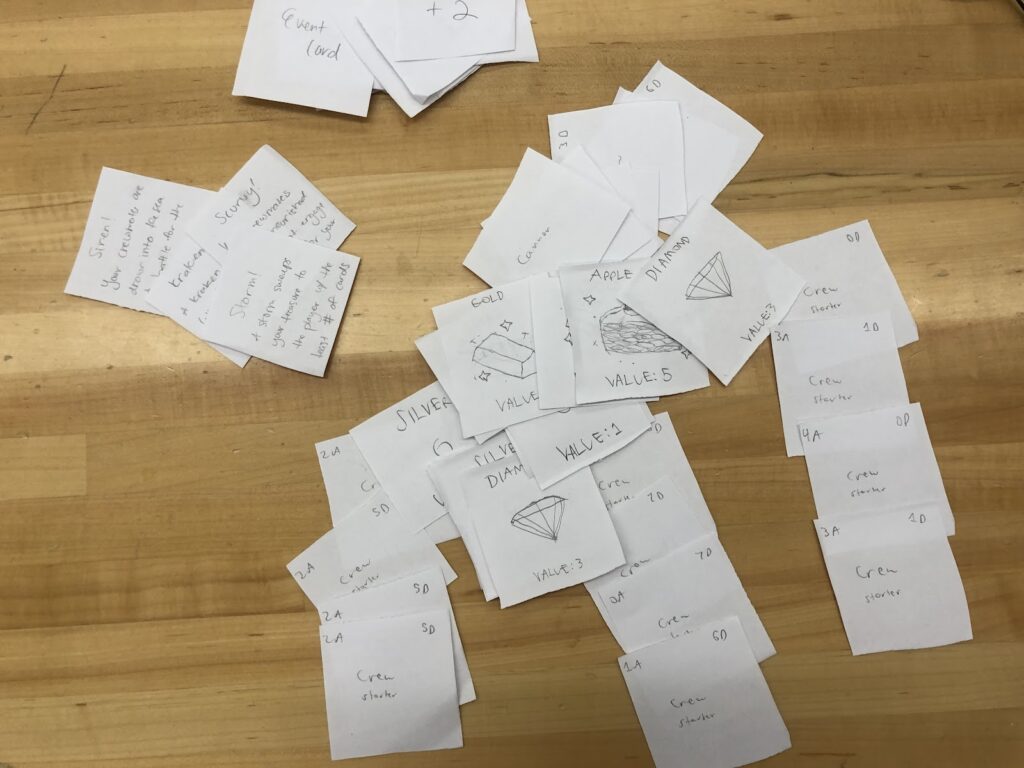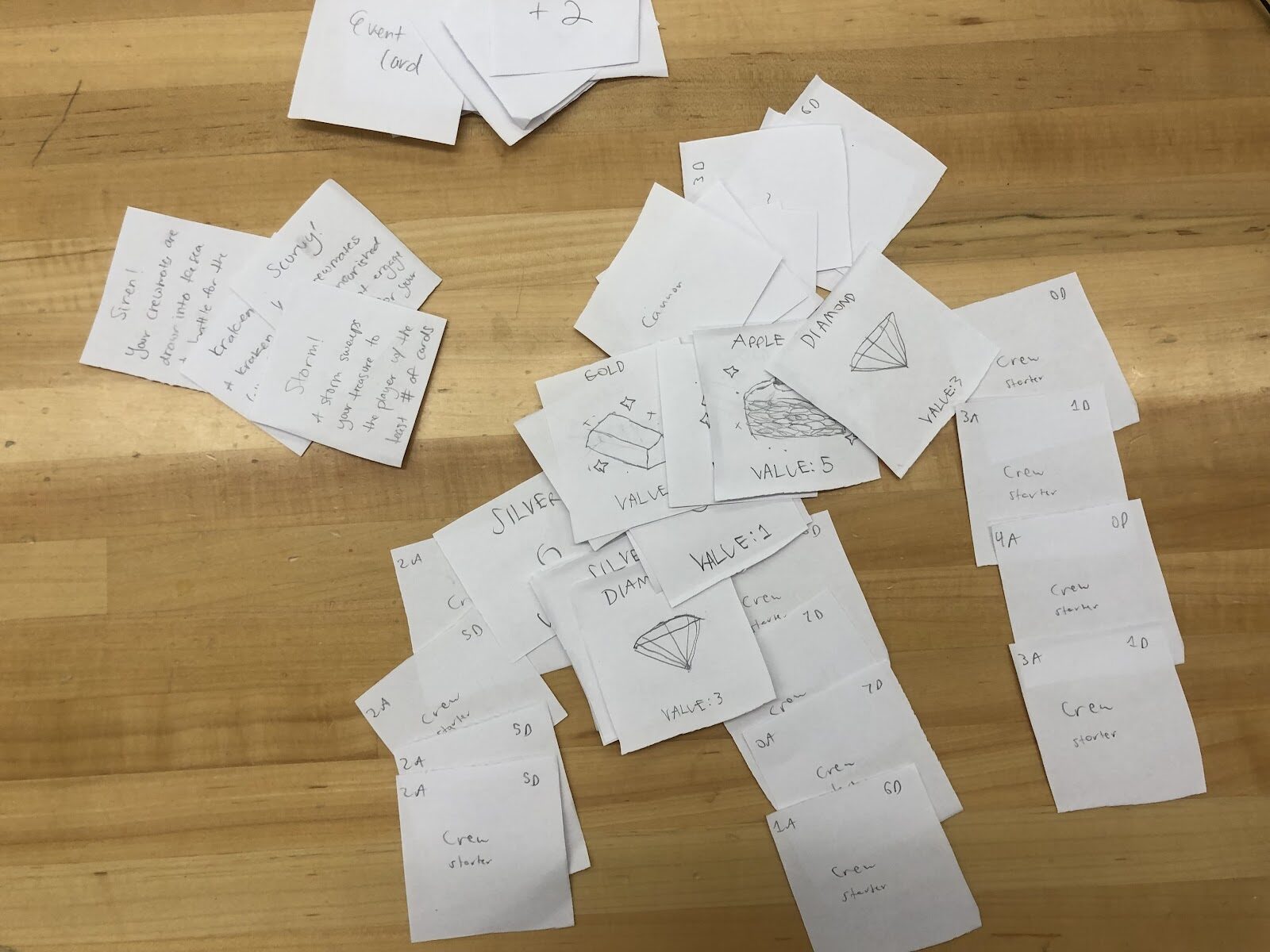Our goal is to make a game about pirates and ships – collect treasure or eliminate other players! When we first met on Tuesday (Feb. 13th), we decided to play Control for our review. We enjoyed the chaotic gameplay – even if you acquire a lot of points/fuel cells, you (or maybe everyone at the same time) could lose everything because of one powerful card, and the killing blow you decided upon to gain lots of points or utterly sabotage someone could be reversed. That reversal could also be reversed, though – this dynamic of intense uncertainty is something we aim to emulate, as pirate battles were also often unplanned and messy. We also liked the tension between sabotaging other players and accumulating points of your own.
We tried settling on something early on to constrain our creativity going forward. We already knew that we wanted to make a simple, short, and card game although we’re open to a few board elements. This alone left us with a lot of directions we could go in, so we wanted to settle in on a theme that we liked and thought could work well with this also. We considered a few suggestions such as pirate ships battling, a tavern brawl, or building an ecosystem, but we thought that the pirate ships idea was the one that had us thinking of the most ideas for mechanics, so we settled for that one. We suggested some mechanics and concepts that would fit this theme such as using cards to represent different parts of the ship, sword fighting, stealing from other players, and an Irish poker-style element of taking risks that become gradually less certain. Overall, our conception of pirates is that they are improvisational experts who go in without a plan but might end up on top anyway, so we were thinking of how to convey feelings of taking big risks and making do without a plan.
Then we met up again in the MADD center to finalize our pitch. We began by thinking through the aspects we jotted down during brainstorming and attempting a bit of a playtest. We used a classic 52-card deck to map out a card pool in the center, a boat or bank in front of each player, and a hand. We played around with how each aspect of the setup would interact with one another and experimented with utilizing the 52-card deck or creating our own cards with more pirate-themed actions. While it is appealing to fully thematicize cards to match the action, we were also attracted to the replayability and universality of using standard cards. (For now, we have decided to pitch with a standard 52 deck, but we’ll see!) If we were using a standard deck, we had to figure out what actions would be represented by each color, suit, and value. Then, we looked over our notes from our “playtest” and honed in on our favorite elements. Our favorites were: a push your luck mechanic, challenges, stealing treasure, boarding ships, and explicit ways to interact with the cards (pick up from the pool, discard into the pool, play from your hand, or place into your bank) We also knew we wanted to keep the game short and make it round-based, similar to Control and easy for playtesting in class. Then we played around with names like Golden Cutlass, Sink or Swim, and Plunderbuss.
Our (currently) unnamed Pirate card-game aims to be an approachable and quick tempoed party game that is easy to learn and play with a standard 52-deck of cards. The team has envisioned a “press your luck” style of gameplay with high stakes consequences for bold and creative choices. The player must secure their loot before they’re sunk or plundered. We believe the pirate theme pairs nicely with the mutinous and risk-taking game that we strive to curate. The play will be turn-based/round-based for quick games that allow players to swap in and out. Players will have only a few actions available each turn: drawing a card from the pool, playing an action/special card (which may repair your ship or attack other ships), and banking loot from your hand. The playing card suit and/or color will denote which mechanic or role the card may be used for (ex: hearts as health, diamonds as loot). Presently, we are focusing on ironing out trade-off mechanics, special actions/environmental events for royalty cards, and overall gameplay flow for an exciting and dynamic game. As we play test and gather feedback, we are eager to craft a fun and complete game amongst the endless creative choices that lie ahead.
Update: 2/22
We met again on Sunday, Monday, and Tuesday to iron out the details for our 3 or 4-player game. Because of the specific mechanics we have in place, we decided against using a regular 52-card deck and instead made custom cards – simple ones doodled on small slices of paper. For inspiration, we played Galaxy Trucker & Cat in the Box. We implemented a simpler version of the shipbuilding mechanics found in Galaxy Trucker (our smaller ship boards are 2×3) and also added similar event cards (Curses). From Cat in the Box, we took the philosophy of punishing players for getting too greedy.
Our game revolves around ship-to-ship combat and stealing treasure from other players. Treasure cards are dealt at the start of the round and are redeemed for treasure tokens that are placed on each player’s shipboard. Players can enter increasingly risky combat situations with the crewmates that guard the treasure tokens (i.e. Robbing) or fire cannons to destroy crewmates – and potentially the treasure too! A push-your-luck philosophy is central to the game and is most prevalent in combat, where you can draw cards from a Roulette deck to increase your chances of successfully Robbing at the risk of drawing a Curse, which punishes greedy players with per-turn penalties.
We finished up this basic system on Sunday and were able to playtest successfully, but the game needed to be more balanced and there needed to be more interesting strategy. Crewmates have two stats – Attack and Defense – and combat favored attackers too strongly because drawing could continue indefinitely if either player doesn’t give up, so we added the restriction that players can only draw 2 Curse cards during an attempt at Robbing. If you draw 2, combat stops. We also changed the effects of Curses and slightly loosened and adjusted rules to make for a more freeform and varied experience.

Our cards from Sunday’s playtest
Because we got stuck on reworking the combat system, we considered that we might readjust the game to resemble Incan Gold and change the premise so that pirates would be raiding different islands together for treasure. However, for the sake of time (rebuilding from scratch would be inconvenient) and because pirate ship battles ultimately seemed more thematically interesting, we decided that for Thursday’s playtest (2/22/2024) we’ll go with the version of the game we playtested on Sunday but slightly reworked. Going forward, we will have a large pool of ideas to draw from, but for now, our priority is to create a solid base game experience so that we can add frills and new mechanics more freely.
Update 2/29
At this stage for Curse of Greed our goal as a team was to implement play test feedback to ensure a better player experience, and balance gameplay mechanics to have a better paced game for the players across rounds. We received varying and interesting feedback that we will do our best to address and incorporate. We’ll first address the feedback on both sides and discuss how we incorporated this going forward.
Some common issues that players encountered were: struggling to digest ruleset in entirety as formatted (different cards, action indecision, competitive flow), some individual difficulties balancing risk/reward and treasure distribution, and overall friction between understanding of the scope of the game and ways/reasons to strategize. Many players initially struggled with understanding our ruleset quickly/much time was spent referring to rules for clarification. Choosing an action was particularly confusing as players didn’t understand the consequences of each. Additionally, the chance for having too little treasure on the board encouraged small skirmishes that discouraged some risk taking. We sought to implement changes that addressed these concerns.
Some positive aspects that players enjoyed were: the genre and possibility for action and risk that were compelling but needed tuning, drafting aspects of seeing what all other players build, the luck based aspects (e.g. roulette, stealing from other players), and the sheer destructive force of cannons. Players seemed to enjoy interfering with the success of others, so we wanted to ensure that we kept competitive options and further incentivized them.
Going forward, we have listened and have strived to implement some changes that improves the overall feel of agency, adventure, and a surplus of piracy. We have assembled a new version of the rule book to help the flow of understanding all the rules and choices to be made within a turn. This should drastically improve the pace of game and assist in ironing out player incentives. We are also in the process of redesigning cards and the player “ship” to be functionally recognizable at a glance for each different card type and role. To limit the chances of treasure being too low and add more ways to push your luck, we also added a fishing mechanic that can lead players to find more treasure. Fishing also allows for players to gain special crewmates and stat-adjusting items that we are excited to playtest.
Overall, we are confident that we can continue to improve our game to offer a novel and engaging pirate experience with balanced gameplay.
Update 3/8
In the final iteration of Curse of Greed, the team assembled to finalize and iron out an even clearer and more concise rule book along with some balancing tweaks. Our last play tests, both in class and as a group, helped expose some minor pacing issues and a few ambiguous cards and rules. Despite this, we received very positive feedback and observed numerous enjoyable player experiences. Specifically, people enjoyed the competitive nature of robbing from each other and the very opposite approach of fishing.
Our biggest change was removing the round-based aspect of Curse of Greed. We observed that the round focused mode had made players play a bit too safe for the level of danger we imagine pirates to engage in. A few players chose to exit with only small to moderate amounts of treasure instead of staying in to risk it all like a true pirate on the high seas. Since each round ended up lasting much longer than we expected, leaving felt pretty boring since you had to keep watching a round that may last another 15 minutes.
By making the game only one round, we are striving to turn up the intensity and mitigate the boring aspects in some “luck of the draw” gameplay. Instead of tallying all treasure across three rounds, the end conditions have become either first player to accumulate 10 treasure wins or tallying treasure upon all curse cards being exhausted. This should keep most games as a close race with balanced swings of fortune. To further accomplish this, we added more crew mates to the fishing pile while decreasing total treasure slightly to encourage valuing attacking and defensive prowess. Furthermore, adjustments to speed and consequence of engaging in robberies should quicken the stoppages in action.
Lastly, we made some tweaks to some card text to make them clearer or to balance them with the new single-round gameplay. One of these includes an updated reference card that will hopefully decrease the need for players to repetitively refer back to the rulebook.
– Jacob, Louis, Catherine, Dylan
